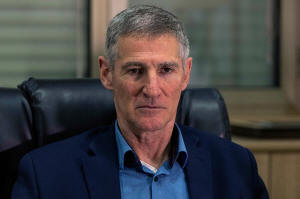Israeli politician critiques the Gaza war's toll on Palestinians and
sparks an outcry
[May 22, 2025]
By TIA GOLDENBERG
TEL AVIV, Israel (AP) — Killing babies “as a hobby.” “Expelling a
population.” “Fighting against civilians.”
It is some of the harshest language against Israel’s wartime conduct in
Gaza and it came this week from a prominent Israeli politician, sparking
a domestic uproar as the country faces heavy international criticism.
It is not uncommon for politicians to criticize Prime Minister Benjamin
Netanyahu’s war strategy, especially his failure to free all the
hostages held by Hamas. What made the comments by center-left opposition
party leader Yair Golan rare — and jarring to officials across the
political spectrum — was their focus on the plight of Palestinians.
The ensuing controversy underscored how little the war’s toll on Gaza’s
civilians has figured into the public discourse in Israel — in stark
contrast to the rest of the world.
Speaking to the Israeli public radio station Reshet Bet, Golan — a
former general — said Israel was becoming a pariah state and cautioned
that “a sane country doesn’t engage in fighting against civilians,
doesn’t kill babies as a hobby and doesn’t set for itself the goals of
expelling a population.”
After the outcry, he said he was referring to the conduct of Israel’s
far-right government, not of its soldiers, in his remarks.

A rare focus on the plight of Palestinian civilians
Golan's words were a shock to the system because, outside of the
country’s politically marginalized left, criticism focused on
Palestinian civilian suffering and deaths has rarely been spoken
publicly in Israel.
The reasons for this include: the trauma Israelis still feel over Hamas'
deadly attack on Oct. 7. 2023, Jewish citizens' deep faith in the
righteousness of the military, dozens of hostages remain in Gaza and
soldiers are dying to rescue them.
Criticism of the war has focused overwhelmingly on Netanyahu. His
opponents believe his own political motives have dictated war strategy
and his failure to reach a deal with Hamas to release all the hostages —
an accusation he denies.
“Part of the Israeli public and media outlets are still trapped in an
obsession over the initial shock that started this war,” said Ehud
Olmert, a former prime minister and fierce critic of the current
government. “But this is changing and it’s just a matter of time.”
Public opinion polls show that most Israelis support ending the war in
exchange for the release of the remaining 58 hostages held by Hamas,
around a third of whom are said to be alive.
Opponents of the war have tended to focus on concerns over the fate of
the remaining hostages and the risk of soldier casualties in a campaign
that many feel has run its course.
While Olmert disputed Golan's choice of words, he said the essence of
his remarks “reflects what many people think.”

Israelis are still traumatized by Hamas' attack
After Hamas' 2023 attack, in which 1,200 people were killed and 251
taken hostage, Israelis rallied behind the military. They saw the war as
a just response to the deadliest attack in Israel's history. Many
Israelis cannot imagine a future where Hamas remains intact.
Israel's retaliatory war in Gaza has killed more than 53,000 people,
mostly women and children, according to local health authorities, whose
count doesn't differentiate between combatants and civilians. The
fighting has displaced 90% of the territory's roughly 2 million
population, sparked a hunger crisis and obliterated vast swaths of
Gaza's urban landscape.
While international media coverage has largely focused on the war in
Gaza and its toll on civilians there, in Israel the media still devotes
heavy attention to the Oct. 7 attack itself and the hostage crisis.
Photos of those still held captive line the streets.
Stories about the plight of Palestinian civilians are less prominent,
and largely avoid the harshest images emanating from Gaza. Most outlets
repeat the official line that Hamas is solely to blame for the civilian
toll.
[to top of second column]
|

Israeli Deputy Minister of Economy and Industry Yair Golan, a
legislator with the dovish Meretz party, poses during an interview
with The Associated Press at his office at the Knesset, Israel's
parliament, in Jerusalem, Jan. 17, 2022. (AP Photo/Tsafrir Abayov,
File)

For many Jewish Israelis, it is hard to fathom that their own
children, most of whom must enlist in Israel’s military, could be
committing the crimes that Golan described.
All that has helped solidify a national narrative that views the war
as an existential struggle.
“When you fight a war of existence, you don’t much think about the
suffering of the enemy,” said Shmuel Rosner, a senior fellow at the
Jewish People Policy Institute, a Jerusalem think tank.
Golan's words have sparked outcry before
A former deputy chief of staff of the military, Golan's words have
sparked outcry in the past. The most notable occasion was a 2016
speech marking Israel's Holocaust remembrance day, when he compared
what he said was an increasingly illiberal atmosphere in Israel to
that of Nazi-era Germany.
On Oct. 7, Golan donned his uniform and grabbed a gun to help battle
militants during Israel's flailing first response to Hamas' assault.
Olmert called him “one of Israel's greatest warriors."
Golan is not the first public figure to have made such remarks about
Israel's conduct in Gaza.
Former defense minister and military chief of staff Moshe Yaalon
accused Israel of ethnic cleansing during a major operation last
year. Zehava Galon, a former leader of a dovish political party,
highlighted the deaths of thousands of children at a recent protest
in Tel Aviv.
But unlike them, Golan has his political future at stake, lending
more weight to his words.

Pictures of dead Palestinian children
Netanyahu said Golan's words “echoed disgraceful antisemitic blood
libels.” Benny Gantz, an opposition leader, said Golan's remarks
were extreme and false and called on him to recant and apologize,
which he did not do.
Cabinet minister Amichay Eliyahu suggested Golan's words inspired an
attacker in Washington, who killed two Israeli embassy employees and
yelled “Free, free Palestine” after he was arrested. “Yair, the
blood of the embassy employees is on your hands,” he wrote on X.
Golan, in response, said it was Netanyahu's far-right government
that “gives fuel to antisemitism and Israel hatred.”
Rosner said Golan's wording on the Palestinian toll was “uncareful”
and that instead of triggering introspection, they prompted a media
debate over Golan himself and the damage his remarks might cause to
Israel.
But they could resonate among the steadfast anti-war protest
movement, said Alma Beck, an activist who is part of a small
contingent of demonstrators who have been holding up pictures of
Palestinian children killed in Gaza ever since Israel ended a
ceasefire in March. She said the group began as 20 people and has
grown to 600, still just a fraction of the thousands attending the
broader anti-government protests.
Beck said the protest movement has been receptive to messages that
focus on the Palestinian toll, and more signs with that message have
been held up by demonstrators in recent weeks. Their main criticism
remains that Netanyahu is continuing the war to appease his
governing partners and ensure his own political survival.
“I think there is a shift. I think people are starting to connect
the dots,” she said, while noting that the bulk of Israeli society
hasn't changed. “I hope that it will only grow.”
All contents © copyright 2025 Associated Press. All rights reserved
 |